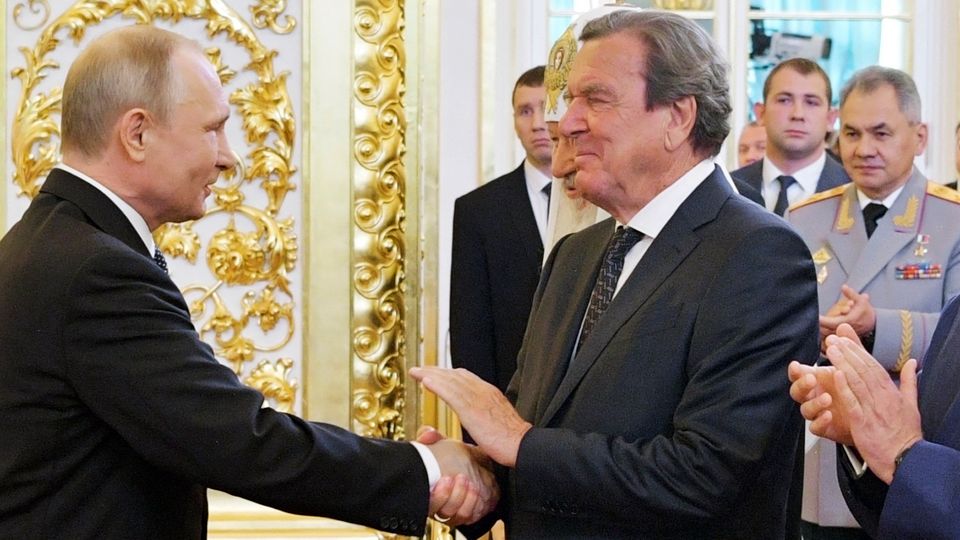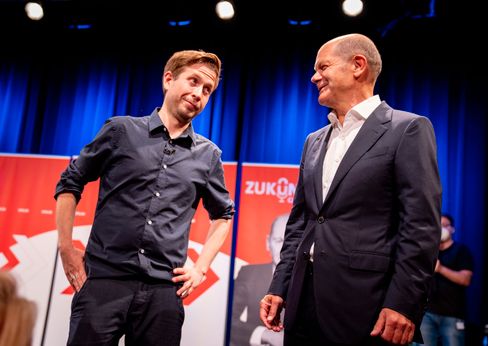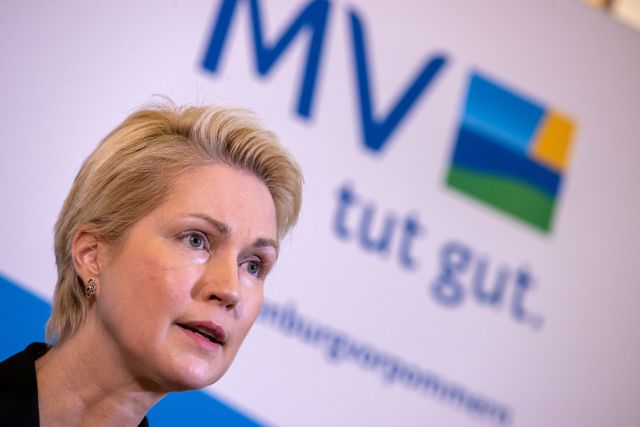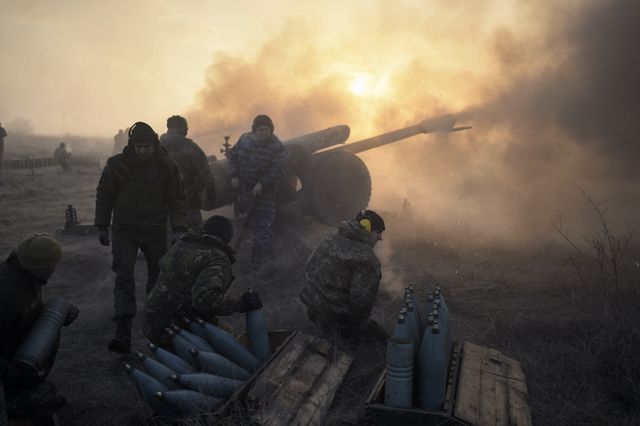
Faltering Foreign Policy Germany Has a Russia Problem


Business partners Vladimir Putin and Gerhard Schröder in a 2018 archive photo
Foto: Alexei Druzhinin/ dpaThere is a clear and present danger of a war of aggression in Europe, but the German government doesn’t seem to have recognized it yet. What other explanation could there be for Berlin’s inexplicable paralysis in its approach to Russia?
It is all the more disconcerting because Germany, as the most important member state in the European Union, should be playing a key role in the standoff. But it is far from living up to that responsibility. Russia is threatening war against Ukraine, and German Chancellor Olaf Scholz’s response has been a vague threat of "consequences" should Moscow decide to invade. What kind of consequences? He hasn’t said.
The reason for the tentative approach is clear: The tri-party coalition government of Scholz’s Social Democrats (SPD), the business-friendly Free Democrats (FDP) and the Greens hasn’t come to an agreement on what sort of punitive measures might be deployed. And in such a grave situation as the one developing on Ukraine’s eastern border, that is a catastrophe.

A satellite image of the Russian military base in Yelnya
Foto: HANDOUT / AFPThe gravity of Russia’s militant behavior is not particularly difficult to recognize. Satellite images and videos offer proof of the concentration of Russian troops near the Ukrainian border, and evidence that units from far-flung areas of Russia have been relocated to the country’s western frontier. More than 100,000 soldiers are now stationed there, along with tanks and heavy artillery. Russia has not only issued an ultimatum to the Americans and Europeans that Ukraine never be allowed to join NATO – it has also demanded that the entire European security regime of the last 25 years be revised because Moscow allegedly feels as though it is being encircled by NATO.
Russia is demanding that all NATO troops be withdrawn from alliance member states in Eastern Europe and it wants a guarantee that the neighboring Scandinavian countries of Finland and Sweden will never join the alliance. Last week, representatives from the U.S. and Russia met in Geneva for talks, but afterwards, Deputy Russian Foreign Minister Sergey Ryabkov wasn’t interested in further negotiations because the Americans and NATO weren’t inclined to meet the entire catalog of Moscow’s maximalist demands.
Despite this alarming global political crisis, the German government has been surprisingly reserved in its comments. Chancellor Scholz has been notably reticent and over-reliant on formulaic banalities. The government has emphasized that it would act in concert with the EU and NATO if Russia were to launch an attack, but Berlin hasn’t even been able to promise that it would put a stop to the Baltic Sea gas pipeline, Nord Stream 2, in the event of war. The pipeline has long been extremely controversial because it would allow for the direct delivery of natural gas from Russia and Germany, circumventing both Ukraine and Poland. Berlin apparently continues to think it conceivable that gas will ultimately flow through the pipeline – even if Russia attacks Ukraine. What, then, is the value of all the talk of "consequences"?
In German political circles, all kinds of people are currently talking not about what Berlin will do in response to a Russian attack. Rather, they are focusing on what they won’t do. That doesn’t just apply to politicians belonging to the coalition parties, but is also true of Friedrich Merz, who is set to be voted in as the next leader of the conservative Christian Democratic Union (CDU) – the country’s leading opposition party – in the coming days. Last weekend, he expressed his opposition to excluding Russia from the global payment system SWIFT, which is one of the most painful potential sanctions that has been proposed. Such a step would block the access of Russian banks and companies to international payment flows. And ruling out all kinds of tough sanctions both relieves pressure on Moscow and sends a clear message: Russia can rely on Berlin’s inactivity.
Indeed, with Germany looking weak and divided, Moscow can feel emboldened in its current course. Especially given that there are prominent apologists for Russia’s aggressive policies within the governing coalition.
The greatest handicap for Germany’s foreign policy is currently Chancellor Scholz’s SPD. Large swaths of the party, as the current crisis has laid bare, continue to be mired in nostalgia when it comes to their approach to Moscow – a wistfulness that one might be more likely to associate with the Left Party. On Germany’s far left, admiration of authoritarian regimes is standard: The U.S., they tend to believe, is evil, while Russia isn’t considered to be all that bad.
The degree of denial currently on display within the SPD, though, is shocking. Last weekend on Twitter, SPD parliamentarian Ralf Stegner dished up a veritable greatest hits of this approach to international relations. He complained of the "disconcerting tone" in German commentaries about Russia and diagnosed "rhetorical saber rattling." Commentators are adopting a "Cold War tone," he wrote, adding that a "unilateral arms buildup and spiral of sanctions is being demanded where diplomacy and a lowering of tensions is badly needed."
It is a rather bizarre message. For Stegner, a credible deterrence against Russia and support for Ukraine is "saber rattling." But he completely ignores Moscow’s actual saber rattling. As a reminder: Russia has positioned an entire army on Ukraine’s border and is unilaterally threatening war.
Beunruhigende Tonlage in den meisten Kommentaren zur Außenpolitik.
— Ralf Stegner MdB (@Ralf_Stegner) January 16, 2022
Da werden deutsche Waffenlieferungen an die Ukraine gefordert, im Ton des Kalten Krieges kommentiert und einseitig Aufrüstung und Sanktionsspiralen befördert, wo Diplomatie und Entspannung dringend vonnöten sind.
Ralf Stegner: "The tone of most commentaries on foreign policy is disconcerting. There are calls for German arms deliveries to Ukraine, comments in the tone of the Cold War and unilateral arms buildup and spiral of sanctions where diplomacy and a lowering of tensions is badly needed."
Ich bin damit einverstanden, dass mir externe Inhalte angezeigt werden. Damit können personenbezogene Daten an Drittplattformen übermittelt werden. Mehr dazu in unserer Datenschutzerklärung.
Stegner’s tweetstorm wouldn’t be complete, of course, without mentioning "Ostpolitik." For many in the SPD, it is a kind of magic word for everything that somehow has to do with Russia. The word refers to Chancellor Willy Brandt’s policy of "change through rapprochement" in the 1970s. But the situation then was completely different than it is today. Back then, it was about easing tensions between two, huge power blocks – and not about an antagonist seeking to shift borders and expand its sphere of influence through the concrete threat of war. Ostpolitik also, it should be mentioned, didn’t involve a country that openly attacked its political opponents in the West with poison and other forms of deadly violence. When an SPD member demands "Ostpolitik" these days, it is merely a salve on the SPD soul and an expression of understanding for Russia.

SPD politician Kevin Kühnert and Olaf Scholz during a campaign event in 2021
Foto: Kay Nietfeld / dpaRalf Stegner, it should be mentioned, isn’t a particularly important figure within the SPD. But he is symptomatic of this party. And he is far from being the only SPD politician who has displayed a somewhat fragile connection to reality in this crisis. Rolf Mützenich, the SPD floor leader in parliament, has been giving one interview after the next lately in which he expresses a significant amount of understanding for Russia’s feelings of being under threat – and very little for the same feelings among Russia’s neighbors. In December, he demanded an end to the "reciprocal threats" in the Ukraine crisis. But when did Ukraine threaten Russia? And with what?
Of course, the Russian view must be considered. But not at the precise moment when Russia is holding a pistol to the head of its neighbor.
SPD General Secretary Kevin Kühnert even went so far as to say that one should be careful not to "fuel" potential international crises through overwrought rhetoric. Kühnert claimed that such rhetoric was aimed at putting an end to certain projects that "have always been a thorn in the side." He was talking about Nord Stream 2, the pipeline of which the Green Party – the SPD’s coalition partner – has been skeptical for years. The debate over Nord Stream 2 and Russia’s approach to Ukraine should not be mixed, Kühnert said.
Using that logic, one could also argue that the needs of Germany’s export industry should be kept apart from a potential invasion of Ukraine. But because Europe, with good reason, isn’t interested in getting involved in armed conflict itself, economic sanctions are the strongest measures currently available.
It is difficult to understand why so many SPD members insist on excluding this pipeline project from possible sanctions – a project that has already served to isolate Germany within the Western alliance for the past several years.
Does it perhaps have to do with the fact that the pipeline’s origins are directly connected to the SPD, particularly with Gerhard Schröder, the last SPD chancellor of Germany? Shortly before he was voted out of office, Schröder agreed to the deal for the first Nord Stream pipeline with Russian President Vladimir Putin – and then immediately became chairman of the board of the company operating the pipeline after he left office. He is now also chairman of the board of directors of the Russian oil company Rosneft. Part of the problem is that many within the SPD, and in Germany at large, continue to see Schröder as a completely normal ex-chancellor and as an elder statesman. In fact, though, he is a nothing other than a paid lobbyist on Moscow’s payroll.
Still, Exhibit A of the problematic relationship to Russia maintained by elements of the SPD is perhaps Manuela Schwesig, governor of the state of Mecklenburg-Western Pomerania, in which the German terminal of the Nord Stream 2 pipeline is located. In order to circumvent American sanctions aimed at the pipeline – and to even deploy a ship to finish the project – she relied on Russian money to establish an "environmental" foundation. Most political parties in Europe receiving Russian funding are of the right-wing populist variety – but now money from Moscow is flowing into a foundation belonging to an SPD-led state government.

Mecklenburg-Western Pomerania Governor Manuela Schwesig
Foto: Jens Büttner / dpaLuckily, there are important exceptions within the party. Among them is Michael Roth, head of the Committee on Foreign Affairs in the Bundestag, Germany’s parliament. In comments to DER SPIEGEL, he supported using Nord Stream 2 as a bargaining chip and demanded that Germany show "resolve" in its interactions with Russia. He, too, invokes "Ostpolitik," but he refreshingly applies a different definition to it than others in his party. A "new European Ostpolitik," Roth says, should "also include the security interests of our Central European partners." Those interests, as it happens, are often ignored by many Russia apologists: They like to speak of Russia as a "neighbor," as though Poland, Ukraine and the Baltic states didn’t exist.
During the campaign, Scholz claimed that if he was chosen to lead Germany, whoever ordered leadership from him would also get it. If that is the case, then it is high time for him to find clear words for Moscow, particularly given the mixed messages and appeasement rhetoric coming from his own party. Scholz is not a member of the pro-Russia wing in his party, but he too has frequently repeated the untruth that the Nord Stream 2 pipeline is "purely a private economic venture." It is very hard to believe that Scholz doesn’t recognize the political dimensions of this project.

German Foreign Minister Annalena Baerbock lays flowers at the memorial in Kyiv to the protesters killed on the city's Maidan Square.
Foto: Janine Schmitz/photothek.de / imago images/photothekIndeed, Putin himself made it clear last autumn that he sees the pipeline as a tool for exerting pressure: He said that he would only consider delivering more gas to Western Europe if Nord Stream 2 was allowed to commence operations. And Germany’s Eastern European neighbors have always seen the pipeline as a geopolitical project, as has the U.S., even if the Biden administration has recently bent over backwards to prevent Congress in Washington from slapping sanctions on Germany in the middle of ongoing tensions with Russia. As such, Germany’s ongoing prevaricating is a slap in the face of its allies. U.S. government representatives are careful to emphasize unity with Germany in public, but behind the scenes, Germany’s continued unwillingness to say that the Nord Stream 2 pipeline could be part of a package of sanctions has been met with bewilderment in Washington among many who are otherwise well-disposed to Germany.
The only person in the German government who has taken a clearer position so far is Foreign Minister Annalena Baerbock, whose Green Party has clearly opposed Russian hegemonic ambitions in the past, as have large parts of the Free Democratic Party (FDP). The two smaller partners in the coalition government in Berlin have a more realistic stance on Russia than the SPD. This offers a glimmer of hope that the government could ultimately wind up adopting robust measures after all.
The fact that the foreign minister first made a stopover in Ukraine before her meeting on Tuesday with Russian Foreign Minister Sergey Lavrov served as an important gesture. However, the Chancellery has claimed the lead in foreign policy since the start of the new Russia crisis and is literally slamming the brakes on Baerbock.

Ukrainian soldiers in battle against Russian-backed separatists in eastern Ukraine
Foto: MARKIIAN LYSEIKO/EPA-EFE/REX/ShutterstockIt is now up to Chancellor Scholz to counter the tendencies toward Russian nostalgia in his party and clearly commit to possible punitive measures. These would, of course, also have to include Nord Stream 2. Europe will remain weak for as long as Germany hesitates in clearly pointing out the possible consequences to Moscow. It’s safe to say that Germany must be far more active when it comes to the future of Europe, its security order and Russia’s future influence on the Continent.
This has long since ceased to just be about Ukraine, which Russia views as being part of its historical territory. For Vladimir Putin, this is not just about averting danger, but also about restoring power and influence in Europe using the only means he has: the military. Admittedly, his country’s economic output is only just twice that of Switzerland – with 17 times as many inhabitants.

A military convoy with Russian and Syrian flags near Manbij, Syria
Foto: Omar Sanadiki/REUTERSRussia’s military, however, has shown in recent years – from Georgia to Syria and Crimea – that it is capable of waging wars effectively. One can’t rule out the notion that the conflict would not stop at Ukraine’s borders. Russian representatives are already making indirect threats against other states. Mikhail Ulyanov, the permanent representative of Russia to international organizations in Vienna, for example, recently claimed that the Baltic states’ membership in NATO destabilizes their immediate surroundings. Most recently, Sweden, which is not a member of NATO, sent additional troops to the Baltic island of Gotland in response to increased Russian activities in the region.
The German government must respond to the threat from Russia. Berlin should reconsider its opposition to arms deliveries to Ukraine. It is incomprehensible that Germany is refusing this support to a partner country in such dire need. It is a given that Germany and Europe need to agree on their own military deterrent in the face of the new Russian threat.
Above all, though, it’s time for the SPD to give itself a reality check. In Germany's left-wing circles, the word "warmonger” remains popular vocabulary for discrediting anyone calling for an economic, military and political strategy in the face of Russia’s destabilizing and bellicose intentions. In those circles, anything Russia does is never half as bad as what the U.S. or Europe does to ensure their security.
But there can be no doubt these days about just who is the true warmonger and wager of wars. It is imperative that this fact is recognized not only that the German government and particularly the chancellor’s party, the SPD, but also that they act accordingly.














